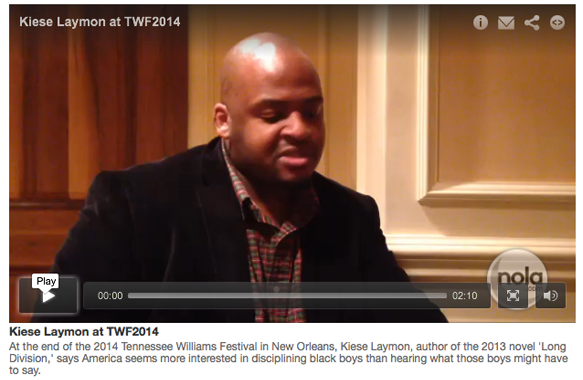Kiese Laymon, Author of ‘Long Division,’ Speaks Up for Black Boys and Girls
When Kiese Laymon, a novelist and essayist who was featured at the Tennessee Williams Festival, was talking Sunday afternoon, he dated a certain event as having happened near the time “when I got kicked out of school.” According to Gawker.com, I’m one of the 304,342 who’d read about Laymon’s expulsion from Millsaps College in his essay “How to Slowly Kill Yourself and Others In America.” So there was no need for him to elaborate, no need for him to detail the racial tension he felt at Millsaps and his less than polite response.
Laymon went on to make whatever point he was making, but long after he had moved on, I still felt envious that he could use sentences that include “when I got kicked out of school,” that those sentences could be true, not fiction, and that — despite all that — he could still be where I wished I were: writing powerful essays read by hundreds of thousands and signing his name on the title page of a wildly inventive novel, a wildly inventive novel that asks an important question.
Here’s the question: What do you do when you’re black and you have hopes and dreams and more than a little talent, and white people conspire to make you look ridiculous? Do you double your efforts to be perfect, to show them that you are too good for them to mistreat you? Or do you do what Citoyen Coldson, the protagonist in “Long Division” does, and plumb act a fool?
Let’s say it’s been your m.o. to be quiet and play nice. Let’s say that focus has got you your own column in a newspaper. Why does the idea of acting a fool seem so tempting?
City, as the main character is called, is in the finals of a national contest that’s similar to a spelling bee. It’s called “Can You Use That Word in a Sentence?” He and his nemesis, LaVander Peeler, have been practicing — jousting really — by crafting long, meandering sentences not unlike the one that forms the second paragraph of this column. But then, with the whole country watching on cable, City gets a word he doesn’t think he should get, a word he figures is meant to embarrass him. The same happens to LaVander who, we learned in the novel’s first sentence, “cares too much what white folks think about him.”
You can read Laymon’s book and still be unclear about what a black boy ought to do. He said Sunday that he doesn’t think acting a fool is helpful, but neither is the reflexive tendency of some black folks in those situations to make themselves small.
Laymon and I talked during the month that three disturbing – but not surprising studies – were published. On March 6, the American Psychological Association, reported that “black boys as young as 10 may not be viewed in the same light of childhood innocence as their white peers, but are instead more likely to be mistaken as older, be perceived as guilty and face police violence if accused of a crime.”
On March 15, The New York Times published a column decrying the findings of a study by the Cooperative Children’s Book Center at the University of Wisconsin-Madison. Researchers combed through 3,200 children’s books published in 2013, and found 93 that were about African-Americans.
~ Kiese Laymon, author of ‘Long Division.’
All that came the month after President Barack Obama announced his “My Brother’s Keeper” initiative, which aims to save young boys of color, presumably from themselves.
“I think the nation is obsessed with disciplining black boys and black male bodies,” Laymon said, “and I think the nation is in someway obsessed with making black girl bodies invisible, but what the nation isn’t interested in is listening to or talking to black girls or black boys.”
He wrote in the voice of young, black teenagers from the South, he said, because he thinks they deserve an audience.
“In my novel I think that you see black boys saying, ‘I really want to love, and I really want to be loved, and I’m not sure how to do that when the nation is being unloving to me.’ ”
“But what (City’s) saying is I’m not going to be that unloving person that you’re encouraging me to be. I’m gon’ be messy. I’m gon’ be out the box, but somehow, someway, with my friends and my community, I’m gonna get better at loving.”
Jarvis DeBerry can be reached at jdeberry@nola.com. Follow him at twitter.com/jarvisdeberry.












Leave A Comment